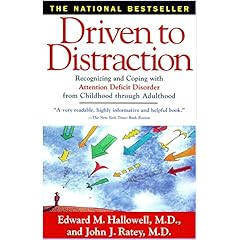 If you have ever found yourself putting the milk away in the cereal cupboard on a regular basis or reading a magazine in the lobby long after that meeting you were supposed to be at started and wondered whether you have ADD or ADHD or AD/HD or Hyper Kinesis or Minimal Brain Dysfunction or whatever they're calling it this year, you could do no better for yourself than to turn to Doctors Edward M. Hallowell and John J. Ratey for diagnosis.
If you have ever found yourself putting the milk away in the cereal cupboard on a regular basis or reading a magazine in the lobby long after that meeting you were supposed to be at started and wondered whether you have ADD or ADHD or AD/HD or Hyper Kinesis or Minimal Brain Dysfunction or whatever they're calling it this year, you could do no better for yourself than to turn to Doctors Edward M. Hallowell and John J. Ratey for diagnosis.I have long linked to their classic book on ADHD, "Driven to Distraction", on my site and have used their list of criteria as fodder for many articles. Their book explores the phenomenon of ADHD through the cases of Dr. Hallowell and provides in depth descriptions of the various aspects of this disorder. I found the book revelatory and insightful, even comforting. I especially found it useful in providing words for me to help explain myself better to my wife in the early years of our marriage. I am much more articulate now than I was then but I still find this book an irreplaceable reference to own.
For your convenience, I am listing their very comprehensive list of criteria here with links to my articles based on each point. For more information on each point, please refer to their book or follow the link to my article. If you find yourself within these twenty points I heartily recommend that you purchase their book or at least borrow it from the town library. I feel confident that you won't regret it. Please keep in mind, however, that ADHD traits mirror those found in everyday, average people. The difference is in their intensity and disfunction. Also keep in mind that this list tends to focus on the negative aspects of ADHD.
SUGGESTED DIAGNOSTIC CRITERIA FOR ATTENTION DEFICIT DISORDER IN ADULTS
NOTE: Consider a criterion met only if the behavior is considerably more frequent than that of most people of the same mental age.
A. A chronic disturbance in which at least fifteen of the following are present:
- A sense of underachievement, of not meeting one's goals (regardless of how much one has actually accomplished).
- Difficulty getting organized.
- Chronic procrastination or trouble getting started.
- Many projects going simultaneously; trouble with follow-through.
- Tendency to say what comes to mind without necessarily considering the timing or appropriateness of the remark.
- A frequent search for high stimulation.
- An intolerance of boredom.
- Easy distractibility, trouble focusing attention, tendency to tune out or drift away in the middle of a page or a conversation, often couple with an ability to hyperfocus at times.
- Often creative, inituitive, highly intelligent.
- Trouble in going through established channels, following "proper" procedure.
- Impatient; low tolerance for frustration.
- Impulsive, either verbally or in action, as in impulsive spending of money, changing plans, enacting new schemes or career plans, and the like.
- Tendency to worry needlessly, endlessly; tendency to scan the horizon looking for something to worry about, alternating with inattention to or disregard for actual dangers.
- Sense of insecurity.
- Mood swings, mood lability, especially when disengaged from a person or a project.
- Restlessness
- Tendency toward addictive behavior.
- Chronic problems with self-esteem.
- Inaccurate self-observation.
- Family history of ADD or manic-depressive illness or depression or substance abuse or other disorders of impulse control or mood.
B. Childhood history of ADD.
C. Situation not explained by other medical or psychiatric condition.
Driven to Distraction, page 73
Like reading The Splintered Mind? Share articles with your friends, link from your blog, or subscribe!
